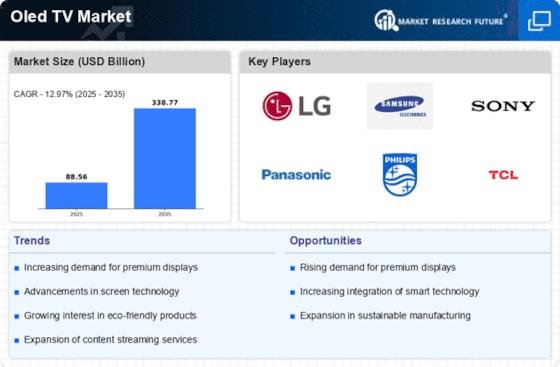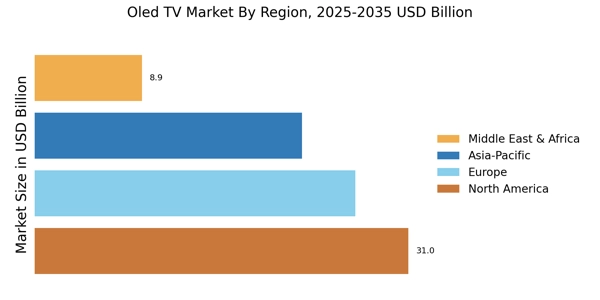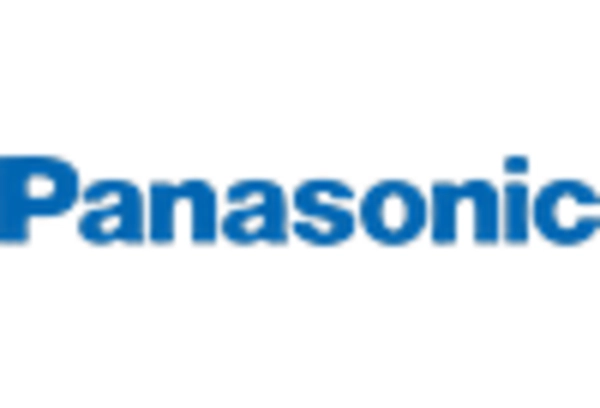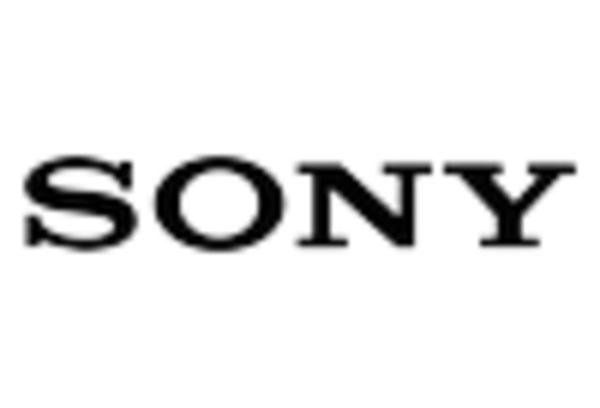Expansion of Content Availability
The expansion of content availability is a crucial driver for the oled tv Market. As streaming services proliferate and high-definition content becomes more accessible, consumers are increasingly drawn to Oled TVs for their superior viewing experience. Recent trends indicate that the number of Oled-compatible streaming platforms has increased by over 40% in the last year, providing consumers with a wealth of options for high-quality content. This growing library of Oled-optimized programming not only enhances the appeal of Oled TVs but also encourages consumers to invest in these advanced display technologies. As the Oled TV Market continues to evolve, the availability of diverse and high-quality content will likely play a pivotal role in driving sales and consumer interest.
Increased Focus on Energy Efficiency
The Oled TV Market is witnessing a heightened emphasis on energy efficiency, driven by both consumer preferences and regulatory standards. Oled TVs are inherently more energy-efficient compared to traditional LCD models, which appeals to environmentally conscious consumers. Recent data suggests that Oled TVs consume up to 30% less energy than their LCD counterparts, making them an attractive option for those looking to reduce their carbon footprint. This focus on sustainability is further supported by government initiatives promoting energy-efficient appliances. As consumers become more aware of energy consumption and its environmental impact, the Oled TV Market is likely to benefit from this trend, as manufacturers continue to enhance the energy efficiency of their products.
Integration of Smart Home Technology
The integration of smart home technology is becoming increasingly prevalent within the Oled TV Market. As consumers seek seamless connectivity and enhanced functionality, Oled TVs are being designed to work in conjunction with various smart home devices. This trend is evidenced by the growing number of Oled TVs equipped with voice control, smart assistants, and compatibility with home automation systems. Recent statistics show that approximately 60% of new Oled TV Market models launched in the past year feature advanced smart capabilities. This integration not only enhances user experience but also positions Oled TVs as central components of modern smart homes. Consequently, the Oled TV Market is likely to see continued growth as consumers prioritize smart features in their purchasing decisions.
Advancements in Manufacturing Technologies
Technological innovations in the manufacturing processes of Oled TVs are significantly impacting the Oled TV Market. Enhanced production techniques, such as inkjet printing and improved panel designs, have led to reduced costs and increased efficiency. These advancements not only lower the price point for consumers but also improve the overall quality of Oled displays. As a result, manufacturers are able to produce Oled TVs at a larger scale, meeting the rising consumer demand. Recent reports indicate that production costs for Oled panels have decreased by nearly 15% over the past two years, which is likely to stimulate further growth in the Oled TV Market. This trend suggests that as manufacturing technologies continue to evolve, the accessibility and affordability of Oled TVs will improve, potentially expanding their market share.
Rising Consumer Demand for High-Quality Displays
The Oled TV Market is experiencing a notable surge in consumer demand for high-quality display technologies. As consumers increasingly seek superior picture quality, Oled TVs, with their vibrant colors and deep blacks, are becoming the preferred choice. Recent data indicates that the demand for Oled TVs has grown by approximately 25% in the last year alone. This trend is driven by the desire for enhanced viewing experiences, particularly among home theater enthusiasts and gamers. The Oled TV Market is thus positioned to benefit from this growing consumer preference, as manufacturers continue to innovate and improve display technologies. Furthermore, the increasing availability of Oled content, including movies and streaming services, further fuels this demand, suggesting a robust future for Oled TV Market sales.

















